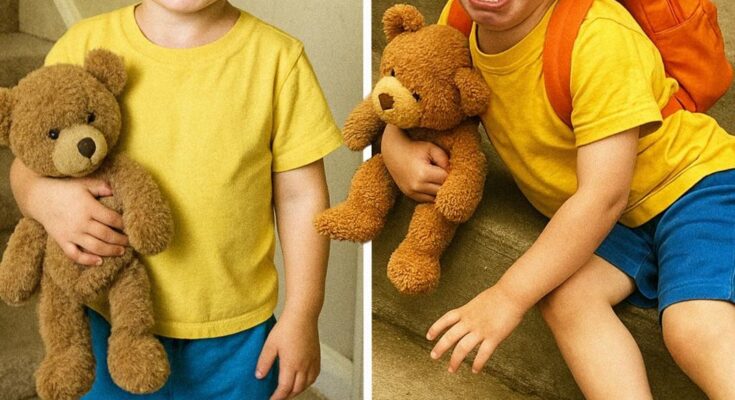I’m 29, a single mom to a three-year-old tornado named Johnny. Until a few weeks ago, daycare was his favorite place on earth. He’d wake up humming nonsense songs, cram contraband action figures into his backpack, and drag me to the car yelling, “Let’s go, Mommy!”
Then, out of nowhere, a Monday changed everything.
I was pouring coffee when a scream split the house—the kind that locks your lungs. I dropped the mug and ran. Johnny was curled in the corner of his room, clutching his blanket, face blotchy and wet.
“What happened, baby? Are you hurt? We have to get ready for—”
“No, Mommy, no! Don’t make me go!”
“Go where?”
“Daycare,” he sobbed, and glued himself to my legs.
I rocked him till he calmed, telling myself it was a bad dream or a toddler mood swing. But the next morning he went rigid at the word “daycare.” By Wednesday he cried until he hiccuped. Thursday night I called our pediatrician, who gently said it sounded like separation anxiety. I wanted to believe her. My gut didn’t.
Friday I was late, frazzled, and I snapped. “Stop it! You have to go to daycare!”
He froze mid-sob, eyes blown wide. My anger drained in one hot rush of shame. I knelt. “I’m sorry. Sweetheart, why don’t you want to go anymore?”
He stared at the floor. When he finally spoke, it was a whisper I almost missed.
“No lunch. Please, Mommy… no lunch.”
Lunch? My stomach dropped.
I kept him home that day. Saturday the daycare offered weekend hours, so I tried a softer plan. “I’ll pick you up before lunch,” I promised. He nodded—our first win all week.
Parents aren’t allowed inside during meals, but the dining room has glass panels. At 11:30 I circled the building and pressed my face to the window.
What I saw made my blood pound.
Johnny sat at the end of a long table, head down. Next to him was an older woman I’d never seen—gray hair in a tight bun, floral blouse, glasses on a chain, no staff badge. She lifted his spoon and jammed it at his mouth. He turned away, crying quietly. She didn’t stop.
“You’re not leaving until that plate is empty,” she scolded.
I shoved the door so hard it banged the wall. Staff jumped. “Ma’am, you can’t be—”
“I don’t care.” I crossed the room, heart hammering. Johnny saw me and sagged with relief. I pulled him into my arms.
“If you ever force my child to eat again, I’ll take this to the state,” I said to the woman.
“It’s our policy,” she snapped. “Kids must eat what’s served.”
“Force-feeding a crying child isn’t policy. It’s abuse.” I turned to the staff. “Who is she? Where is her badge?”
Silence.
We left.
That night, after bath and bedtime stories, I sat on his bed.
“Why don’t you want to eat at daycare?”
He curled into his pillow. “The lady says I’m bad if I don’t finish. She tells the kids I’m wasting food. Everyone laughs.”
It felt like a punch. He wasn’t afraid of food. He was afraid of being humiliated.
Monday morning I worked from home and called the director, Brenda. “We don’t force children to eat,” she said—until I described the woman.
A pause. “That might be… Miss Claire. She’s not staff. She’s a volunteer. My aunt.”
“An unvetted volunteer, disciplining toddlers?” I asked. “Was she background-checked? Trained?”
“She’s always been good with kids. She just has an old-fashioned way—”
“No. I want your volunteer policy in writing and confirmation she won’t be near my son.”
That night I filed a report with the state licensing board. Turns out I wasn’t the first. There had been other complaints—nothing that triggered an inspection. Until a report about an unvetted adult handling children and force-feeding.
Inspectors showed up within days. The findings were worse than I imagined: over capacity, under-qualified staff, unsupervised “volunteers,” and multiple children reporting they were made to “finish” food even if they felt sick.
It wasn’t just Johnny.
The state issued a comply-or-close warning. Brenda called, furious. “Why involve the state instead of talking to me?”
“I did,” I said. “You protected her.”
A week later in the grocery store, another mom, Lila, pulled me aside. “Thank you,” she whispered. “My daughter cried at lunch too. I thought she was picky. After the inspection she told me Miss Claire called her ungrateful if she didn’t eat everything.” Lila swallowed hard. “Your son gave mine the courage to speak up.”
The daycare couldn’t meet the requirements. It lost its license. Some families scrambled; most of us felt relief we hadn’t realized we were holding.
I found Johnny a new center with trained teachers and open doors. On his first day, a teacher crouched to his level. “You eat as much or as little as your tummy wants, okay?” He gave her a real grin and ran in, backpack bouncing.
Now mornings are songs again. He wakes happy, packs too many toys, and sprints to the door. Watching him walk into that classroom—no fear, no flinch—reminds me how quickly kids rebound when they feel safe.
And me? I learned the most important lesson of my life: always, always listen to your child. Even when the complaint seems small or silly. Even when adults wave it off.
Sometimes that tiny voice is the only warning you’ll get.
“No lunch, Mommy.”
Two words. They changed everything.



